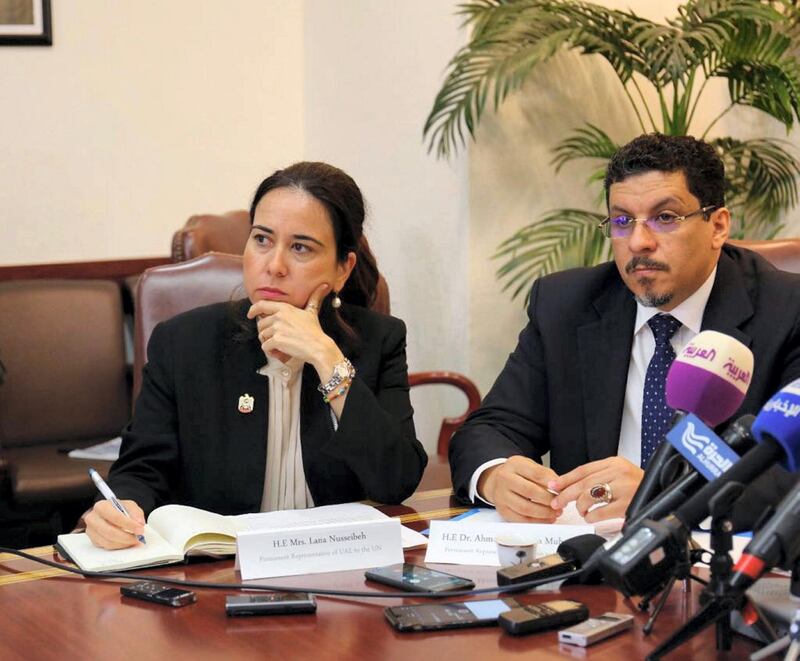The UAE has stockpiled 35,000 tonnes of food aid for Yemen as part of the Arab Coalition's comprehensive plan to assist and protect civilians from the impact of the military offensive to retake the port city of Hodeidah.
The UAE Ambassador to the UN Lana Nusseibeh outlined the strategy to reporters on Thursday as coalition and government forces in Hodeidah prepared to enter the rebel-held city after seizing the airport on its outskirts.
The coalition-led operation in Hodeidah incorporates both military and humanitarian goals and covers all eventualities, including destruction of the port by the rebels, Ms Nusseibeh said in a statement reported by the UAE state news agency Wam.
Most of Yemen's food and humanitarian supplies enter through Hodeidah, which the rebels seized in 2014 along with the Yemeni capital, Sanaa. The coalition says the rebels have used their control of the port to profit from the distribution of goods and to smuggle in arms from Iran.
Ms Nusseibeh said the first aspect of the humanitarian plan was a surge in aid to Hodeidah residents.
In addition to 100,000 tonnes of food already stockpiled in Hodeidah by the UN, which it estimates would cover 6.6 million people for one month, the UAE has 35,000 an additional tonnes on standby in Yemen and nearby for delivery by sea, air, and land.
Ten vessels are already near or en route to Hodeidah, while others are waiting in Saudi ports, Ms Nusseibeh said. Seven UAE-registered aircraft with airdrop capacity are also on standby.
The UAE has also contracted 100 trucks to carry food from Aden, with the first supplies delivered to areas south of Hodeidah this week.
The second aspect of the plan involves keeping Hodeidah port operational if the Houthi rebels damage it.
Ms Nusseibeh said cranes, construction materials and experts were ready to move in immediately to either repair or reconstruct the port in a very short time. The port currently has only two large cranes, one of which is semi-operational, and the aim will be to increase capacity and resume international aid and commercial shipments as fast as possible, she said.
The coalition has also organised de-mining crews to ensure that sea lanes can be reopened swiftly.
_______________
Read more:
[ Arab Coalition ready to push into Hodeidah city: Gargash ]
[ How the Houthis defend Hodeidah and how the Coalition is outfoxing them ]
[ Houthi weapons haul offers insight into Hodeidah tactics ]
_______________
Alternative channels to distribute aid countrywide should the Houthis destroy the port form the third component of the coalition's humanitarian planning. These include airlifts and airdrops, increased aid flows through other ports, and new road routes, Ms Nusseibeh said.
The UN envoy said the coalition was also working to ensure safe passage for civilians out of conflict areas in co-ordination the International Organisation for Migration and the UN refugee agency. "Our forces have also dropped leaflets, informing civilians how to avoid harm if they come near areas of active conflict," she said.
The final focus is "to stabilise areas quickly, to make them safe for civilians, and safe for the operations of international humanitarian relief organisations", she said.
The Iran-backed Houthis have controlled Hodeidah since 2014 and have so far ignored a coalition offer allowing them to make a full and unconditional withdrawal to prevent civilian suffering.
Saudi Arabia's UN ambassador Abdallah Al Mouallimi, who hosted the pressing briefing at the Saudi mission, reiterated the coalition's demand that the Houthis quit the city entirely.
"On the ground, what we are offering is for the Houthis to hand over their weapons to the government of Yemen and to leave, to leave peacefully and to provide information about the locations of the mines and improvised explosive devices and so forth," he said.
However, the rebels appear to be preparing for a battle for the city.
Minister of State for Foreign Affairs Dr Anwar Gargash said on Thursday that the Houthis were "indiscriminately placing mines, IEDs, snipers and heavy weaponry amongst residential areas".
The Houthis are blocking off-loading of aid at Hodeida port; destroying water and sewage systems; indiscriminately placing mines, IEDs, snipers and heavy weaponry amongst residential areas.
— د. أنور قرقاش (@AnwarGargash) June 21, 2018
Military sources told Agence France-Presse that the army, backed by troops from the UAE, had been sending backup troops to the area ahead of a major offensive to close in on Hodeidah port.
"Our preparations are in their final stages for the advance on the port," a source said.
With a rebel withdrawal appearing unlikely, Yemeni forces are reportedly planning to cut off the main route leading from Hodeidah to Sanaa and other rebel-held areas in northern Yemen including Saada province, the Houthis' stronghold.
The UAE is playing a leading role in the Arab Coalition, which intervened in the Yemen war in March 2015 at the request of the internationally recognised government of President Abdrabu Mansur Hadi.
Government forces supported by the coalition have regained control of much of southern Yemen since then, including the southern port city of Aden where the government is now based. They are fighting the rebels on several fronts besides Hodeidah, including the south-western province of Taez and in Saada province bordering Saudi Arabia.
The Yemeni military on Friday reported gains in Saada, cutting off a Houthi supply route and killing 12 rebels.
Brigadier Adel Al Musabi of the Special Forces Brigade told the Yemeni armed forces media centre that troops managed to reach the road linking Saada and the Al Malahiz-Haradh triangle, blocking supplies to rebels in those areas.





